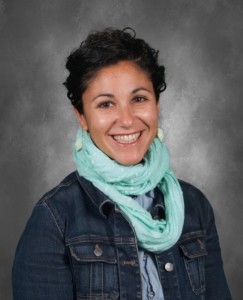Elizabeth “Betsy” Cepparulo, an ICNC High School Curriculum Fellow, developed, offered and moderated a course on the introduction to civil resistance in 2016 as part of the ICNC High School Curriculum Fellowship.
The information featured below was submitted as part of the fellowship requirement that, among others, included creating a detailed course proposal, developing curriculum content, designing evaluation tools, selecting participants and extensive moderation throughout the course.
Learn more by clicking on the topic links:
Go back to the main ICNC High School Curriculum Fellowship page.
 Elizabeth “Betsy” Cepparulo is a History teacher at Wilmington Friends School, in Wilmington, Delaware. She specializes in a course called Global Peace and Justice, which teaches world history through topics such as women’s rights, civil disobedience, social justice, and peace in a time of conflict. Prior to teaching, Betsy was an attorney in Pennsylvania for four years, focusing mainly on family law and criminal defense. She has her BA from Skidmore College, her JD from Temple University, and her Masters in Education Policy and Leadership from Stanford University.
Elizabeth “Betsy” Cepparulo is a History teacher at Wilmington Friends School, in Wilmington, Delaware. She specializes in a course called Global Peace and Justice, which teaches world history through topics such as women’s rights, civil disobedience, social justice, and peace in a time of conflict. Prior to teaching, Betsy was an attorney in Pennsylvania for four years, focusing mainly on family law and criminal defense. She has her BA from Skidmore College, her JD from Temple University, and her Masters in Education Policy and Leadership from Stanford University.
Course Title: Nonviolent Direct Action
High School: Wilmington Friends School, Delaware
Abstract: In this course, students will explore civil resistance movements from both practical and personal standpoints. Practically, students will learn concrete steps to engaging in a nonviolent direct action (NVDA) campaign. This will differentiate civil resistance and NVDA from passivity, which is sometimes confused with peaceful resistance. Personally, students will study Gandhi and Indian Independence, James Lawson and MLK Jr with the Civil Rights movement, and finally Colombian civil resistance in the face of violence. Students will write their own NVDA plans, contemplate a “peace force,” and explore the pros and cons of fighting violence and oppression with active peace. In the end, students will be able to articulate concrete steps and nuanced perspectives in ending conflict with civil resistance.
Learning Gains Survey Results:
The Learning Gains Survey aims to measure knowledge gains among course participants. Participants take the Pre-Seminar Survey at the beginning of the course and take an identical survey (Post-Seminar) at the end of the course. Included below is the graphed responses to the questions from the Pre-Seminar and Post-Seminar Surveys. In general, the surveys illustrate a positive trend in the knowledge gains achieved by participants as a result of the course.
Learning Gains Survey Answer Key:
The following questions were answered on a scale of 1-5, where:
1= None 2 = A little bit 3= adequate 4= Good 5 = Excellent
Learning Gains Survey Questions:
- Rate your level of familiarity with nonviolent direct action as a specific strategy for achieving change
- Rate your level of familiarity with the definition of Nonviolent direct action
- Rate your level of familiarity with Gandhi’s methodology for achieving nonviolent civil resistance
- Rate your level of familiarity with India’s struggle for independence
- Rate your level of familiarity with James Lawson’s techniques for nonviolent civil resistance
- Rate your level of familiarity with Martin Luther King, Jr’s techniques for nonviolent civil resistance, specifically his four-step plan
- Rate your level of familiarity with nonviolent direct action during the civil rights movement in the American south
- Rate your level of familiarity with using civil resistance against violent groups
- Rate your level of familiarity with the “comunidades de paz,” in Colombia and their methods of civil resistance
- Rate your level of familiarity with “peace forces” as an alternative for a military army
- Rate your level of interest in nonviolent civil resistance as an alternative to war
- Rate your likelihood of using nonviolent tactics in the future to create change that you believe in
Learning Gains Survey Results Explained:
As you can see in the graph above, the majority of students reported having low levels of familiarity with various civil resistance struggles and tactics when completing the Pre-Seminar LGS at the start of the course. However, by the time students completed the Post-Seminar LGS, at the end of the course, they reported much higher levels of familiarity with each struggle listed and general civil resistance knowledge. The overall civil resistance knowledge level of the students more than doubled as a result of their experience in this course.
Go back to the main ICNC High School Curriculum Fellowship page.
